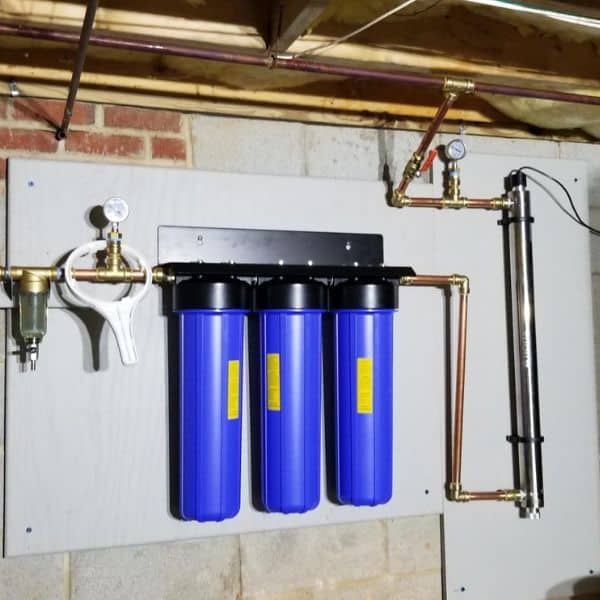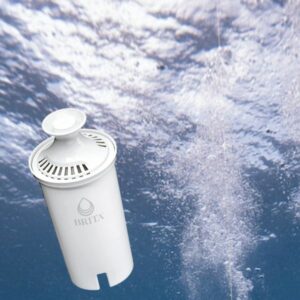How Much Does a Well Water Filtration Cost?
When it comes to filtering well water, homeowners often wonder how much they should expect to pay for such a whole house system. The cost of a well water filtration system can vary depending on several factors, including the type and size of the system, the complexity of installation requirements, and ongoing maintenance costs.
On average, homeowners can expect to pay anywhere between $500 to $5,000 for a basic well water filtration system. This cost includes the equipment itself as well as installation by a professional. However, some more complex systems that require additional features or larger capacities may cost upwards of $10,000 or more.
It’s important to keep in mind that while the upfront cost of installing a whole house water filter may seem high, it’s an investment that will ultimately save you money over time by reducing reliance on bottled water and decreasing wear and tear on your plumbing fixtures due to hard mineral deposits. Here is a list of the best whole house water filters for well water that you can check out.
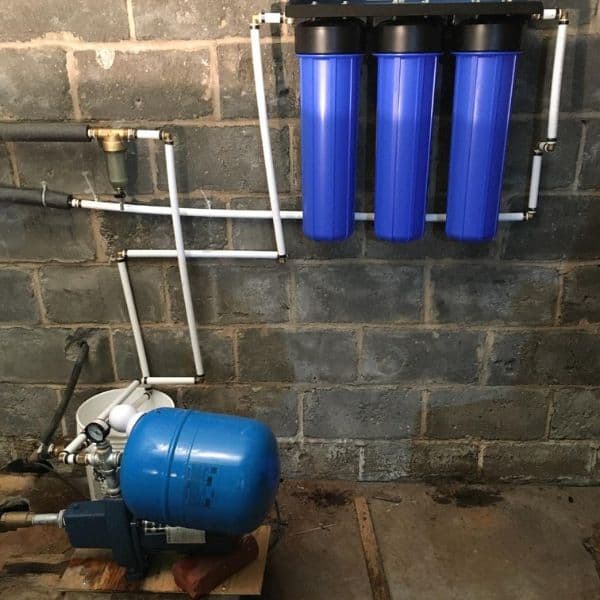
Factors Affecting Home Water Filtration System Cost
Before installing a water filtration system, it’s crucial to consider the factors that will affect its cost. Understanding these factors can help you decide which filtration system to purchase for your home.
System Type
When choosing a home water filtration system, one of the main factors that affect cost is the type of system you choose. Several different types of systems are available on the market, each with unique features and price points. More advanced and sophisticated systems will be more expensive than basic models.
Common home water filtration systems include activated carbon filters, reverse osmosis, and ultraviolet sterilization units. Activated carbon filters are typically the least expensive option and work by removing impurities from your water through a series of adsorption processes. Reverse osmosis systems may cost several hundred dollars but will remove more than 80% of various impurities from your water. UV sterilization units are the most expensive option and have been proven to be the best at purifying water.
System Size & Capacity
Another main factor affecting cost is the system’s size and capacity. Homeowners need to consider how much water they use daily and any specific filtration needs they may have. A larger home or family will require a larger system with more capacity than a smaller home or single occupant.
The type of filtration technology used also plays a role in determining cost. Reverse osmosis systems are typically more expensive due to their complex design and ability to remove a wider range of contaminants. Carbon filters, conversely, are less expensive but may need to be more sufficient for homes with high contamination levels in their water supply.
Number of Filters
Changing well water filters is another important factor that adds up to the cost of the installation of a well water purification system. The more filters you have, the higher your costs will be. However, this increased cost can also provide additional benefits like better water quality and lower maintenance requirements.
The most basic types of filtration systems typically include only one filter installed at a single point in your home’s water supply. These systems are relatively inexpensive and easy to install, making them an ideal option for homeowners on a budget or those who want to invest less time or money into their water quality needs. However, these systems may only provide adequate filtration for some contaminants and may require more frequent filter replacements.
As you move up to multi-stage filtration systems with multiple filters installed throughout your home’s plumbing system, costs and performance capabilities will increase.
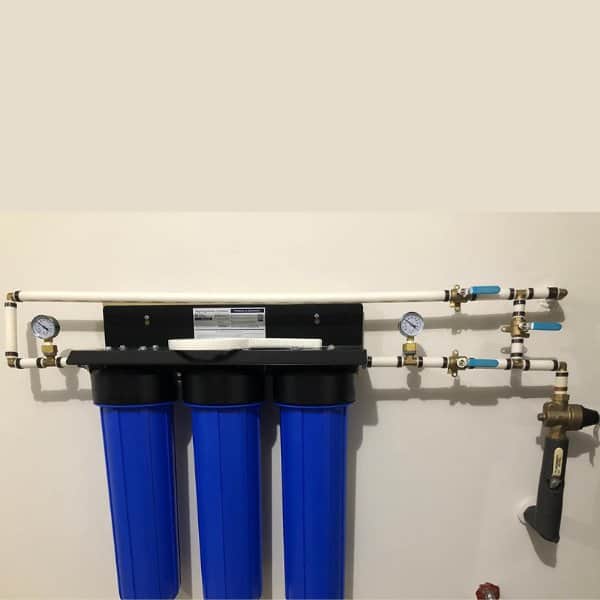
Filtration Performance
Filtration performance refers to how well a system can remove contaminants from your water supply. Some systems may only offer basic filtration capabilities, while others are designed to eliminate even the most stubborn pollutants, such as lead and mercury. Generally speaking, the more effectively a system removes contaminants, the higher its price tag will be.
While choosing a cheaper option to save money upfront may seem tempting, investing in a high-quality filtration system can save you money in the long run.
Installation Cost
The installation process for well water systems can be complex and require a professional’s expertise, which inevitably adds to the final bill. It’s important to consider this expense when deciding whether or not to invest in a home water filtration system.
The installation cost can vary depending on several factors, such as the type of system being installed, the location where it needs to be installed, and any additional plumbing or electrical work required. For example, whole-house filtration systems typically cost more than point-of-use systems because they are larger and require more comprehensive installations.
Additionally, if your home has unique plumbing configurations or requires extensive modifications before installation, these costs may increase quickly.
Water Testing
When you purchase a home water filtration system, it’s important to remember that water testing is the main factor affecting its cost. Water testing is necessary because it determines the contaminants in your tap water, which will affect what type of filter you need.
It’s essential to accurately understand what pollutants are present in your tap water to determine which filtration system will be most effective and affordable. The more comprehensive and detailed the initial testing process is, the more expensive it may be.
Maintenance Cost
Maintenance cost is another major factor that affects the overall cost. While many different types of filtration systems are available on the market, each one requires regular maintenance and replacement of its parts. Failure to do so can damage your system or poor-quality water.
Selecting a reliable and efficient filtration system is one way to keep your maintenance costs low. Not all water filtration systems are created equal; some require more upkeep than others. Understanding what you need regarding water quality and usage can help you identify the best system for your home.
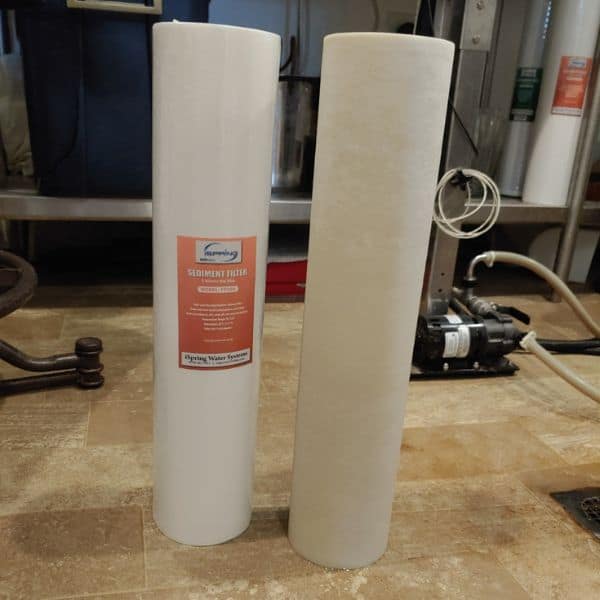
Types of Well Water Filtration Systems
Various types of well water filtration systems are available in the market, each designed to remove specific contaminants from your drinking water. The type of system you choose depends on the quality and quantity of impurities in the well water. The most common well water filtration systems include:
- Sediment filters
- Activated carbon filters
- Reverse osmosis systems
- Ultraviolet disinfection units
Sediment Filters
Sediment filters are an essential part of any water filtration system. They work by trapping and removing impurities like sand, silt, and clay from well water. These filters are typically made from a porous material that allows water to flow through while capturing unwanted particles.
The process of sediment filtration is relatively simple. Well water enters the filter housing and passes through a bed of filter media, which can be anything from sand to activated carbon. As the water flows through this bed, larger particles become trapped in the media while smaller particles pass through until subsequent media layers eventually filter them out.
Activated Carbon Filters
Activated carbon filters are highly effective water filtration systems that can remove impurities from well water. These filters work by using activated carbon, a material that has been specially treated to create a high surface area and porous structure. The pores in the activated carbon material trap impurities as they pass through, resulting in clean and healthy drinking water.
Creating activated carbon involves heating organic materials like coconut shells or wood at high temperatures without oxygen. This creates an amorphous form of carbon with millions of tiny pores that attract and capture impurities like chlorine, pesticides, herbicides, and other chemicals commonly found in well water. Activated carbon filters are typically installed under your sink or attached to your main water supply line, providing fresh and clean drinking water every time.
Reverse Osmosis Systems
A reverse osmosis system is a type of water filtration system that uses a semipermeable membrane to remove impurities from well water. Most RO systems use a series of filters, which work together to purify the water before it reaches your faucet. The membranes used in RO systems are specially designed to allow only pure water molecules through while blocking larger molecules like minerals and contaminants.
As well water passes through a reverse osmosis filter, it first goes through a pre-filter, which helps remove larger particles like sand and rust. After this stage, the water enters the RO membrane, where it’s forced through tiny pores under high pressure. This process separates pure H20 molecules from other dissolved solids and minerals in the water.
Once the pure H20 is separated, it flows into a storage tank while any remaining impurities are flushed away as waste.
Ultraviolet Disinfection Units
Ultraviolet disinfection units are an effective way to purify well water for household and commercial use. These units work by using ultraviolet light to kill bacteria, viruses, and other microorganisms that may be present in well water. The process is simple yet highly effective, making it a popular choice for homeowners who want to ensure the safety of their drinking water.
The UV disinfection process begins with installing a unit near the well or in the home’s plumbing system. As water passes through the unit, it comes into contact with a UV lamp that emits high-frequency ultraviolet light. This light disrupts the DNA of any microorganisms in the water, rendering them unable to reproduce or cause harm. The time water spends in contact with the UV lamp determines how effective the disinfection will be.
It’s crucial to have your well water tested by a professional before purchasing a filtration system to determine which impurities are present in your drinking water.
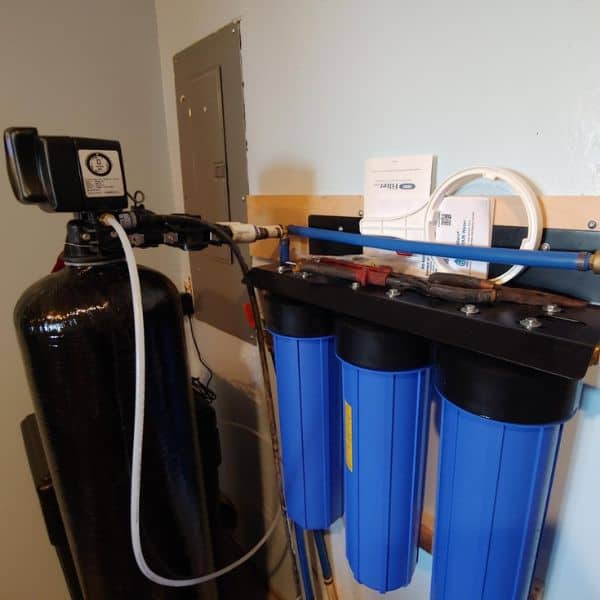
Factors to Consider when Choosing a Well Water Filter
Choosing the right well water treatment system can be a daunting task. However, it is important to choose the right filter for your specific needs to ensure that you always have safe and clean drinking water. When selecting a well water filter, several factors should be considered.
- Firstly, it is important to understand what pollutants or contaminants are in your well water. This will help determine the filter type best for your situation.
- Secondly, consider your household size and how much water you use daily. This will help determine the flow rate needed for your filter and its capacity.
- Another factor to consider when choosing a well water filter is maintenance requirements and the associated costs. Some filters require more frequent maintenance than others and may incur higher costs over time.
FAQs
Should I hire a professional to install a well water filter?
If you need to decide whether to hire a professional, there are some factors to consider.
Firstly, a professional installer can assess your specific needs and recommend the right type of filter for your well water. They have expertise in understanding the contaminants in well water, such as bacteria, nitrates, and metals like lead or arsenic. Additionally, they can guide you on choosing the right filter size based on how much water your household uses daily.
Hiring a professional installer ensures the installation process is done correctly and safely. Well-water filtration systems require plumbing skills and knowledge of electrical connections, which may be dangerous if not handled properly.
How much does it cost to maintain a well water filtration system?
The cost of maintaining a well water filtration system can vary depending on several factors. The size and type of the filtration system, your location, and the required maintenance level are some essential factors to consider when estimating the cost.
The initial installation cost of a well water filtration system can range from $500 to $10,000 or more, depending on its size and complexity. However, ongoing maintenance costs can range between $100 to $500 per year. This includes replacing filters, and UV bulbs (if applicable), cleaning sediment tanks, or replacing membranes in reverse osmosis systems.
Conclusion
The cost of installing a well water filter system can vary greatly depending on the size of the home, the type of system, and other factors. On average, the well water filter system cost can range anywhere between $500 to $5,000. However, some more complex systems that require additional features or larger capacities may cost upwards of $10,000 or more.
It is important to remember that making a quality investment in a well water filter system will ultimately save money and provide peace of mind for years to come. Professional installation is always recommended for added assurance that the system is up to code and functioning properly.
